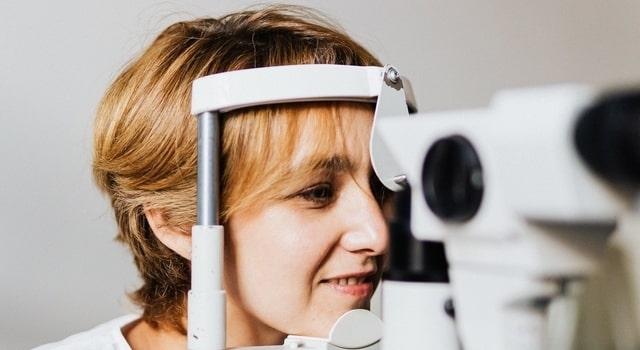
As you get older, your body goes through countless changes. Your eyes are no exception. As you enter your golden years, maintaining eye health becomes crucial, with unique vision challenges and a higher risk of developing potentially vision-threatening eye diseases.
Below, our eye care team at Lifetime Vision 20/20 discusses some of the most common eye and vision issues older adults face. We also explain how regular eye exams can help.
Common Vision Challenges in Older Adults
Aging eyes undergo several changes that can affect vision. Some of the most common issues include:
Presbyopia
Presbyopia is the gradual loss of your eyes' ability to focus on nearby objects. It is a natural part of aging that usually becomes noticeable in your 40s or 50s. It can make reading and other close-up tasks more difficult without corrective lenses.
Dry Eye
As you age, your eyes may produce fewer tears or tears of lower quality, leading to dry eye syndrome. This condition can cause discomfort, irritation, and blurred vision, impacting daily activities.
Reduced Peripheral Vision
Peripheral vision tends to decrease with age, affecting your ability to drive and navigate your environment safely. This reduction can be gradual, often going unnoticed until it becomes a significant issue.
Decreased Contrast Sensitivity
Older adults often experience a decline in contrast sensitivity. This makes it harder to distinguish objects from their backgrounds, particularly in low-light conditions. This can increase the risk of falls and accidents.
Potentially Vision-Threatening Eye Diseases
Several eye diseases become more prevalent with age. Early detection and management are crucial to prevent severe vision loss.
Age-Related Macular Degeneration (AMD)
AMD affects the macula, the part of the retina responsible for central vision. It can cause blurriness, distortion, and eventually loss of central vision, making tasks like reading and recognizing faces difficult. Regular eye exams can help detect AMD early, allowing for treatments that can slow its progression.
Cataracts
Cataracts, the clouding of the eye's natural lens, are common among older adults. They cause blurred vision, glare, and difficulty seeing at night. Surgery to remove cataracts and replace the lens can restore clear vision.
Glaucoma
Glaucoma is a group of eye conditions that damage the optic nerve, often due to high intraocular pressure. It can lead to gradual vision loss and, if untreated, blindness. Regular eye exams can detect glaucoma early, and treatments can help preserve vision.
Diabetic Retinopathy
Diabetic retinopathy is a complication of diabetes that affects the blood vessels in the retina. It can cause vision loss if not managed properly. Regular eye exams are vital for detecting changes early, allowing timely treatment, and preventing severe damage.
The Importance of Regular Eye Exams
Regular eye exams are essential for maintaining eye health, especially as you age. These exams can:
- Detect Early Signs of Eye Disease: Many eye conditions develop slowly and without obvious symptoms. Early detection through regular exams can lead to timely treatment and better outcomes.
- Monitor Chronic Conditions: If you have conditions like diabetes or hypertension, regular eye exams can help monitor for eye-related complications.
- Update Prescriptions: As your vision changes, updating your eyeglass or contact lens prescription can ensure the best possible vision correction.
- Assess Overall Eye Health: Comprehensive eye exams evaluate the overall health of your eyes. They check for signs of disease, structural changes, and functional issues.
What to Expect During an Eye Exam
A comprehensive eye exam typically includes:
- Visual Acuity Test: Measures the sharpness of your vision using an eye chart
- Refraction Test: Determines your prescription for corrective lenses
- Eye Movement Test: Checks the muscles controlling eye movement
- Pupil Dilation: Widens your pupils to allow a better view of the retina and optic nerve
- Tonometry: Measures intraocular pressure to screen for glaucoma
- Retinal Examination: Special lenses examine the retina for signs of disease
Maintaining Eye Health
In addition to regular eye exams, you can take steps to maintain your eye health:
Eat a Healthy Diet: Include foods rich in vitamins A, C, and E, as well as omega-3 fatty acids
Protect Your Eyes: Wear sunglasses to shield your eyes from UV rays and safety glasses when necessary
Manage Chronic Conditions: Keep conditions like diabetes and hypertension under control
Avoid Smoking: Smoking increases the risk of eye diseases
Preserve Vision with Regular Eye Exams
By prioritizing your eye health and requesting regular eye exams, you can detect and manage potential issues early. This helps preserve your vision and maintain your quality of life in your golden years. Speak to our Jamestown eye care team at Lifetime Vision 20/20 to learn more.
